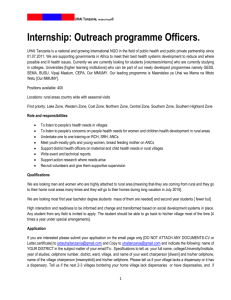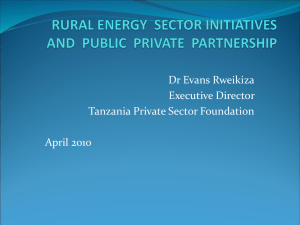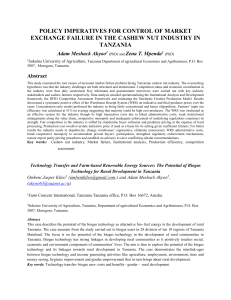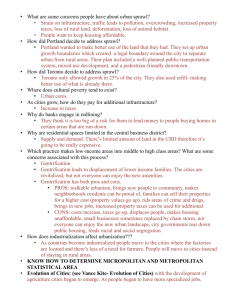- Society for Research into Higher Education
advertisement
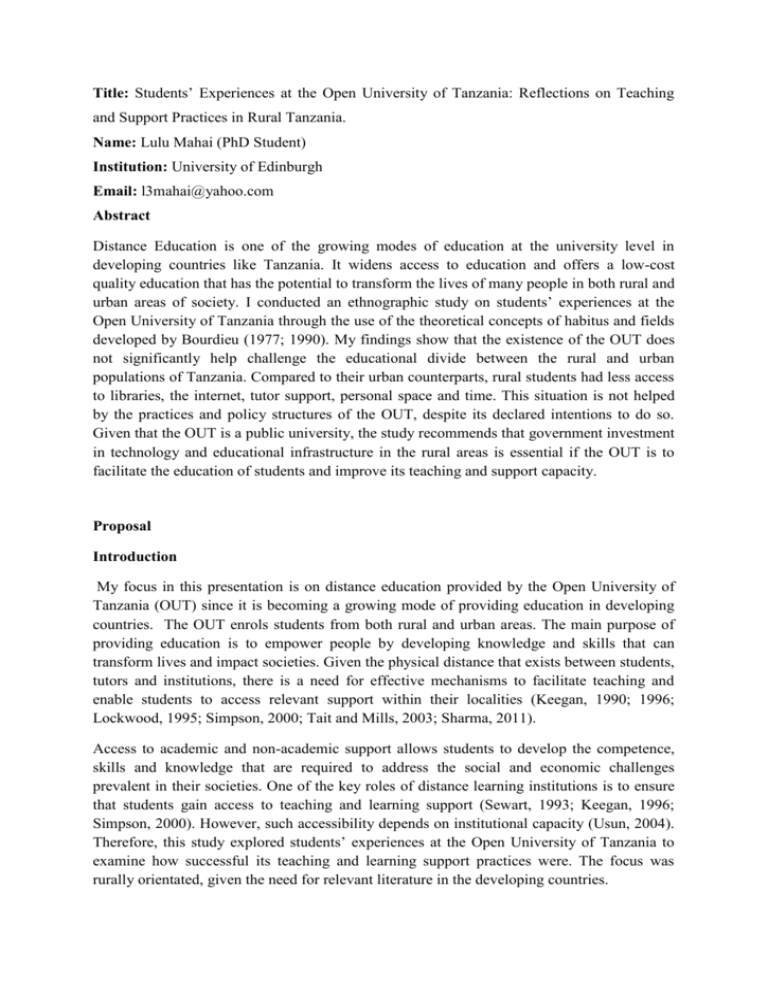
Title: Students’ Experiences at the Open University of Tanzania: Reflections on Teaching and Support Practices in Rural Tanzania. Name: Lulu Mahai (PhD Student) Institution: University of Edinburgh Email: l3mahai@yahoo.com Abstract Distance Education is one of the growing modes of education at the university level in developing countries like Tanzania. It widens access to education and offers a low-cost quality education that has the potential to transform the lives of many people in both rural and urban areas of society. I conducted an ethnographic study on students’ experiences at the Open University of Tanzania through the use of the theoretical concepts of habitus and fields developed by Bourdieu (1977; 1990). My findings show that the existence of the OUT does not significantly help challenge the educational divide between the rural and urban populations of Tanzania. Compared to their urban counterparts, rural students had less access to libraries, the internet, tutor support, personal space and time. This situation is not helped by the practices and policy structures of the OUT, despite its declared intentions to do so. Given that the OUT is a public university, the study recommends that government investment in technology and educational infrastructure in the rural areas is essential if the OUT is to facilitate the education of students and improve its teaching and support capacity. Proposal Introduction My focus in this presentation is on distance education provided by the Open University of Tanzania (OUT) since it is becoming a growing mode of providing education in developing countries. The OUT enrols students from both rural and urban areas. The main purpose of providing education is to empower people by developing knowledge and skills that can transform lives and impact societies. Given the physical distance that exists between students, tutors and institutions, there is a need for effective mechanisms to facilitate teaching and enable students to access relevant support within their localities (Keegan, 1990; 1996; Lockwood, 1995; Simpson, 2000; Tait and Mills, 2003; Sharma, 2011). Access to academic and non-academic support allows students to develop the competence, skills and knowledge that are required to address the social and economic challenges prevalent in their societies. One of the key roles of distance learning institutions is to ensure that students gain access to teaching and learning support (Sewart, 1993; Keegan, 1996; Simpson, 2000). However, such accessibility depends on institutional capacity (Usun, 2004). Therefore, this study explored students’ experiences at the Open University of Tanzania to examine how successful its teaching and learning support practices were. The focus was rurally orientated, given the need for relevant literature in the developing countries. Research Questions 1. How do students experience teaching and learning support at the OUT? 2. What challenges do they experience in their studies and how do they cope with the situation? 3. What recommendations are in place to improve teaching and learning support in rural Tanzania? Theoretical Framework The study utilised the theoretical concepts of habitus and fields which were developed by Bourdieu (1977; 1990). These concepts assisted in understanding the students’ experiences and locations in a social field. The understanding of students’ experiences and their trajectories was facilitated by observing three social spaces: the domestic (home), rural (community and employment), and academic field of the OUT. However, other concepts such as support services and distance education were also used to add value to the study. Methodology The qualitative study was conducted in the developing country of Tanzania. It has a poor economy, with more than 80% of its people living in rural areas. The study used an ethnographic strategy which allowed multiple applications of data collection methods, including interviews, document reviews and observations. A total of 24 students were selected to take part in the study. Interviews were digitally recorded and transcribed, while data analysis and theme generation were facilitated with the use of NVivo and thematic analysis. Themes were inductively developed. Consent was sought from participants and confidentiality issues were maintained. Findings The theoretical framework adopted facilitated the discovery of inadequate access to teaching and learning support among the rural students. This, in turn, affected students’ ability to develop a habitus suitable for learning at a distance. Most of these students came from a conventional system of education that differed from the practices employed in distance education. Because their physical environment was limited in terms of access to physical and human support, rural students experienced inadequate access to tutor support, library services, the internet and space for learning, unlike those conditions enjoyed by their urban counterparts. The inaccessibility of these vital resources only adds to the difficulties that confront distance education students, given the social and economic challenges they already face in rural Tanzania. The inadequate access to resources was mainly due to two factors: poor technological and rural infrastructure, and the OUT’s failure to secure financial support from the government. Moreover, the policies and practical framework adopted by the OUT have singularly failed to challenge the educational divide that exists between the rural and urban populations of Tanzania. Indeed, it might be argued that the strategies operated by the OUT serve only to restrict access to the equal distribution of academic capital. Travelling to town to access the support they required was among the strategies used by some rural students. It soon became apparent that there was a gap between those students who had economic capital (a minority), and those who had not (the majority). The development of students’ intellectual inquiry and critical commentary skills depends on the successful resolution of such issues, while the equal access of provision to teaching and learning support undoubtedly fosters the personal development of students. Recommendations: 1. The OUT’s policy structures, practical strategies and strategic rolling plan should consider issues of equal access to teaching and learning support among rural and urban students in order to minimise the current challenges facing students in rural Tanzania. 2. The Government of Tanzania should improve rural infrastructure and technology provision to enable rural students to successfully achieve their higher education goals. Such improvements would help students to access the global learning resources available through ICT and library services. 3. The Tanzanian Government should also provide the OUT with sufficient financial support to create local regional and study centres within students’ living contexts. References Bourdieu, P (1977). Outline of a Theory of Practice. Cambridge: Cambridge University Press. Bourdieu, P (1990). The Logic of Practice. Translated by Richard Nice. Cambridge: Polity Press Keegan, D. (1990). Foundations of Distance Education. Second Edition. London: Croom Helm Keegan, D. (1996). Foundations of Distance Education 3rd Edition. London: Routledge. Lockwood, F. (1995). Open and Distance Learning Today. Routledge. Sewart, D (1993). Student Support System in Distance Education. Open Learning. Vol 8(3), 3-12. Sharma, D.P. (2011). Distance Education and Student Support Services. New DelhiIndia:Omega Publications Simpson, O. (2000) Supporting Students in Open and Distance learning. Kogan Page Limited. Tait, A & Mills, R (Eds) (2003). Rethinking Learners Support in Distance Education. Change and Continuity in An International Context. London & New York Routledge Falmer. Usun, S (2004). Learners Support Services in distance education System (A case studyof Turkey). Turkish Online Journal of Distance Education . Vol 5: 4

